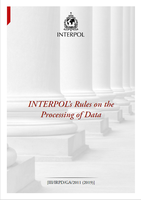Legally compliant state-of-the-art capabilities to fight and prevent transnational crimes
As a partner in the ROXANNE cutting-edge research project, INTERPOL is actively involved in the project legal analysis work in order to help identify applicable legal requirements for the development of privacy-aware technological solutions and legal tools.

All ROXANNE project outcomes must adhere to these legal requirements, including compliance with data processing rules and the respect of principles such as proportionality, data minimization, data retention and human-centric approach to machine operation for continuous oversight and enhancement. In line with the INTERPOL’s mandate1 to promote the widest possible mutual assistance between all criminal police authorities within the limits of existing national laws and in the spirit of the Universal Declaration of Human Rights, INTERPOL has a longstanding commitment to privacy and data protection, dating back to 19742.

The INTERPOL Rules on the Processing of Data (RPD)3 represent the only legal instrument with a global scope regulating the international exchange of criminal data, enabling authorities in 194 countries to exchange police information in line with international standards. This robust set of rules ensures the efficiency and quality of international cooperation as well as due respect for the rights of the individuals who are the subjects of this cooperation. Thus, ensuring compatibility with the RPD within the ROXANNE project’s scope, will contribute to an enhanced usability of ROXANNE technical tools among a wider range of LEAs, both within the EU and beyond, due to their legal compatibility with INTERPOL’s legal system.
As an international police organization enabling cooperation among law enforcement in 194 countries, another important aspect of INTERPOL’s project involvement concerns stakeholder outreach. This enables a multitude of representatives of the global law enforcement community to be heard and taken into consideration in the design and creation of the advanced data analysis technology end product. LEAs have a signification role in guiding technical partners to develop project outcomes in accordance with their real needs (technical, legal, operational requirements). This wide-ranging global law enforcement input strengthens the project’s feasibility and its aim of ensuring a sustainable exploitation of final results. As part of these efforts, the project consortium would like to acknowledge the reactivity of some responded to the ROXANNE call for end-user requirements collection by sharing their insight through over 70 . The consortium will analyse all the gathered feedback for integration into the system design of the ROXANNE platform for a solution tailored to the experiences, realities and needs of LEAs.

The ROXANNE project endeavors to generate tangible outcomes that will assist LEAs with improved investigation capabilities, reduced efforts and costs and contribute to the exchange of targeted, quality information. It is beyond doubt that the ROXANNE project will generate an important amount of knowledge, which will be of interest to the global law enforcement community and for the benefit of societies at large through enhanced security and crime prevention. To this end, the project has established systematic channels and means for disseminating the project objectives, activity, progress and legal and technological outcomes to interested parties. Continuous and open public communication on the project's developments facilitates the establishment of an environment of trust and acceptance of new technologies.

Such innovative and legally compliant approaches to policing as developed in ROXANNE highlight INTERPOL’s commitment to producing the best possible project results that may interest its member countries and contribute to the establishment of the Organization as an innovative legal research hub.
References
1. Article 2 of INTERPOL Constitution https://www.interpol.int/Who-we-are/Legal-framework/Legal-documents
2. In 1974, INTERPOL’s General Assembly adopted Resolution “Privacy of Information” urging parties to take into account the privacy of the individual when exchanging criminal justice information. INTERPOL’s current set of data processing rules, the Rules on the Processing of Data (RPD), entered into force in July 2012. They have since been regularly updated to continue meeting the needs of international police cooperation in a digital world, to keep pace with technological developments and evolving international data protection standards and conventions. https://www.interpol.int/Who-we-are/Legal-framework/Data-protection
3. The RPD govern all the data processing in the INTERPOL Information System, codifying the data protection principles and defining the data processing regime.

